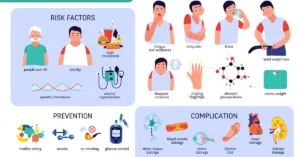Title: Understanding Type 3 Diabetes Life Expectancy
Introduction:
The idea of Type 3 diabetes, which is frequently used to suggest a possible connection between diabetes and neurodegenerative diseases, especially Alzheimer’s disease, has been the subject of an increasing amount of research in recent years. This new area of research raises significant concerns about the ways in which diabetes impacts a person’s lifespan and general health in addition to blood sugar levels. We will examine the relationship between Type 3 diabetes life expectancy in this blog post, providing insight into what the most recent research indicates about the effects of diabetes on mortality and cognitive health.
What Is Type 3 diabetes?
According to certain research studies, Alzheimer’s disease ought to be categorized as type 3 diabetes, a subtype of the disease. However, type 3 diabetes is not a recognized medical term. Neither the American Diabetes Association nor national health organizations recognize it.
Types Of Diabetes
Diabetes mellitus, or simply diabetes, is a medical condition in which your body has trouble turning sugar into energy. In general, diabetes comes in three different forms:
-Type 1 diabetes (T1D) is a chronic illness characterized by elevated blood sugar (glucose) levels caused by insufficient insulin production by the body’s endocrine pancreas.
-A chronic illness known as type 2 diabetes (T2D) is characterized by insulin resistance in the body, which raises blood sugar levels unnecessarily.
-If your blood sugar level rises too high during pregnancy due to the body’s inability to produce enough insulin, you may develop gestational diabetes, or GDM.
The term “type 3 diabetes” refers to the theory that a particular form of insulin resistance and insulin-like growth factor dysfunction that happens in the brain is what causes Alzheimer’s disease.
Some have also used this term to characterize individuals with T2D who are also diagnosed with Alzheimer’s disease. Type 3 diabetes is a very controversial diagnosis that is not generally recognized as a clinical diagnosis in the medical community.
Type 3c diabetes mellitus is another name for diabetes (also called T3cDM, pancreatogenic diabetes, and type 3c diabetes). Pancreatic disorders are the cause of this kind of diabetes. Although it goes by the same name, this is a different condition.
Type 3c Diabetes mellitus
When the endocrine pancreas glands are harmed as a result of damage to the exocrine pancreas glands, T3cDM results. In the tissue of the endocrine pancreas, beta-islet cells manufacture and secrete insulin.
Causes that could result in T3cDM are:
–Exocrine pancreatic cancer,
–Chronic pancreatitis,
–Cystic fibrosis, and
–Previous pancreatic surgery
Numerous researches have indicated a connection between diabetes and a higher chance of Alzheimer’s disease and cognitive decline. This connection is supported by complicated and diverse mechanisms. For instance, the hallmark of Type 2 diabetes, insulin resistance, may contribute to the development of Alzheimer’s by impairing the brain’s capacity to use glucose efficiently.
In addition, diabetes-related oxidative stress and chronic inflammation can accelerate the development of neurodegenerative diseases. Insulin is essential for brain function in addition to controlling blood sugar, and problems with insulin signaling may have an adverse impact on cognitive health.
Connection Between Alzheimer’s And Diabetes
Researchers have investigated a potential connection between diabetes and the onset of Alzheimer’s disease (Trusted Source). Some people think that insulin resistance in the brain could be the cause of Alzheimer’s.
Although there is some scientific evidence to support this claim, it is a little simplified too much.
Diabetes can harm your blood vessels over time, including the ones in your brain, if it is left untreated. The fact that many T2D sufferers are unaware of their illness could postpone diagnosis and treatment.
As a result, people with T2D especially those with undiagnosed diabetes are more vulnerable to this kind of harm.
Alzheimer’s disease may also be caused by diabetes-related chemical abnormalities in the brain. High blood sugar also causes inflammation, which can harm brain tissue.
Diabetes is considered as a risk factor for vascular dementia because of these factors. With distinct symptoms, vascular dementia is a diagnosable condition in and of itself. It might also be an early indicator of future Alzheimer’s disease overlap.
Causes And Risk Factors of type 3 diabetes:

People with T2D may be up to 45% to 90% more likely to develop Alzheimer’s disease or another type of dementia, such as vascular dementia, according to a review of research published in 2022 .
This research According to a reliable source from 2016, there were over 100,000 dementia patients. It revealed that women with type 2 diabetes were more likely than men to experience vascular dementia.
Risk factors for Type 3 Diabetes are:
-Family history of the condition
-Hypertension, or excessive blood pressure,
-Carrying excess weight or obesity
-Specific long-term medical conditions, like depression and polycystic ovarian syndrome (PCOS)
Symptoms Diabetes Type 3
The symptoms of dementia, such as those observed in the early stages of Alzheimer’s disease, may be present in the proposed type 3 diabetes condition.
The Alzheimer’s Association states that these signs and symptoms may consist of:
-Memory loss affecting day-to-day activities and social relationships
-Having trouble finishing routine tasks
-Putting things in the wrong place
-Frequently impaired capacity to form conclusions from information
-Sudden shifts in attitude or personality
Diagnosis Type 3 Diabetes
Since type 3 diabetes is not a recognized diagnosis, there is no particular test for it. The diagnosis of Alzheimer’s disease is made using:
-Neurological assessment
-Medical background,
–Neurophysiological examinations
A medical professional will inquire about your symptoms and family history in multiple ways.
Imaging tests, like head CT and MRI scans, can provide a doctor with an image of your brain’s functioning.Alzheimer’s disease markers can also be found through cerebrospinal fluid testing.
A fasting blood sugar and hemoglobin A1c test may be ordered by a doctor if you exhibit signs of Alzheimer’s disease and T2D but are not yet diagnosed with either condition.
If you are diagnosed with type 2 diabetes, you should start treatment right away. By managing T2D, you may be able to reduce harm to your body including brain damage and delay the onset of dementia or Alzheimer’s disease.
Management Of Type 3 Diabetes

Since type 3 diabetes is not a recognized diagnosis, there is no single course of treatment for it.
For those who have: There are distinct treatment options available.
–Alzheimer’s disease
-Type 2 diabetes,
-Prediabetes
Lifestyle modifications like diet and exercise may be advised by a physician.
Additionally, a physician may recommend a few lifestyle modifications, such as:
Managing weight: For certain diabetic patients, doctors may advise losing weight. A doctor might suggest strategies to help you shed about 7% of your body mass if you are overweight. According to the National Institute of Diabetes and Digestive and Kidney Diseases, this can help stop the harm that high blood sugar causes to organs and may stop prediabetes from becoming type 2 diabetes.
Dietary balance: Eating a diet high in fruits and vegetables and low in fat can help reduce symptoms.
Quitting smoking: Giving up smoking could help you take care of your health.
Balanace Diet: Controlling your diabetes may also help to delay the onset of dementia if you have both type 2 diabetes and Alzheimer’s.
Scholars are examining a potential association between Alzheimer’s disease and the diabetes drug metformin.
A little investigation According to a reliable source, the medication may protect against Alzheimer’s disease, but additional studies According to a reliable source, metformin may make a person more susceptible to Alzheimer’s. To fully understand the connection between this medication and neurodegenerative diseases, more research is required.
Medications For Alzheimer’s Disease
Prescription drugs may be used to treat dementia’s cognitive symptoms, but it’s unclear if they significantly improve Alzheimer’s disease symptoms. Those prescribed medication for Alzheimer’s disease may include:
Intravenous infusion therapy using anti-amyloid antibodies, like aducanumab (Aduhelm) and lecanemab (Leqembi), has the potential to eliminate beta-amyloid from the brain, thereby mitigating cognitive and functional impairment in individuals in the initial stages of Alzheimer’s disease.
Acetylcholinesterase inhibitors, which may enhance the communication between your body’s cells, include galantamine (Razadyne), rivastigmine (Exelon), and donepezil (Aricept).
An NMDA-receptor antagonist called memantine (Namenda) may also help lessen Alzheimer’s symptoms and delay the disease’s progression.
Psychotropic medications are sometimes used by doctors to treat depression and mood swings associated with Alzheimer’s disease. In certain situations, antidepressants and anxiety pills are part of the treatment plan.
Later on in the course of their illness, some people might require antipsychotic therapy.
Prognosis For Type 3 Diabetes
Type 3 diabetes is a term used to characterize Alzheimer’s disease that may arise from brain insulin resistance.
The severity of your dementia and how well your diabetes is managed are two factors that may affect your prognosis.
Some researchers who support the diagnosis of type 3 diabetes think that you might be able to slow the progression of vascular dementia or Alzheimer’s if your diabetes is being treated. However, the evidence is not conclusive.
Where you are in the Alzheimer’s disease progression may also have an impact on your prognosis. It may depend on how soon you were diagnosed with either condition and got started treatment. The earlier you start treatment, the better your chances might be.
An individual with Alzheimer’s disease typically has four to eight years left on their clock after being diagnosed, according to the Alzheimer’s Association. However, some Alzheimer’s patients can survive for up to 20 years after receiving a diagnosis.
Preventing Type 3 Diabetes
If you have type 2 diabetes, controlling your condition with medication and lifestyle modifications may help ward off complications like Alzheimer’s.
Some of the Proven techniques for controlling T2D and reducing organ damage are:
1. Exercising for 30 minutes a day, four times a week;
2. Eating foods high in fiber, protein, and low in saturated fat;
3. keeping an eye on your blood sugar levels in accordance with medical advice
4. Taking prescription drugs on time and consistently
5. keeping an eye on your cholesterol levels
6. Keeping a healthy weight
Related Contents: Type 1 Diabetes life Expectancy
